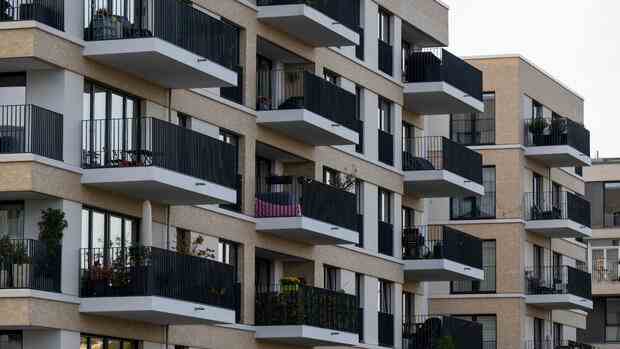The financial regulator Bafin takes a closer look at some credit institutions with their own real estate holdings.
(Photo: dpa)
Frankfurt The financial supervisory authority Bafin examines the real estate investments of eight smaller credit institutions more closely, partly in the form of so-called special audits. According to its own statements, the supervisory authority wants to “get a more detailed overview of the real estate holdings of credit institutions – and determine whether this could result in stability risks for the institutions”. Among other things, they conduct audits in accordance with Section 44 of the German Banking Act.
“The tests began in October 2022 and will be continued in the first half of 2023 and – based on the knowledge gained so far – intensified,” Bafin announced on Monday. The focus is on the question of how valuable the real estate investments of the audited institutes are and how they are taken into account in the balance sheet.
As a background to the audits, the supervisor stated that in recent years more and more credit institutions had aimed to invest more in real estate themselves or to enter the business – “sometimes with larger volumes”. In fact, a number of savings banks and cooperative banks have acquired residential and commercial real estate in order to open up a new source of income through rentals in times of negative interest rates.
Net interest income, the main source of income for the regional banks, has been steadily declining for years. The margins in the lending business were low, even secure government bonds as proprietary investments of the financial institutions yielded little.
Top jobs of the day
Find the best jobs now and
be notified by email.
End of the real estate boom
The supervisory authority points out that some banks are particularly heavily involved in the real estate market – from the purchase of the property to the completion of the property. “The Bafin developed its audit concept in order to keep an eye on the risks caused by this trend and to be able to take countermeasures if necessary – especially in view of the ending boom on the real estate market and the end of the low interest phase.”
The Bafin has identified risks from corrections on the real estate markets as one of the six major threats to financial stability in Germany. These risks hit financial institutions that have both granted a large number of real estate loans and invested in real estate themselves particularly badly.
Real estate experts assume that the turnaround in interest rates on the German real estate market will ensure further falling purchase prices in the coming months. The German Institute for Economic Research (DIW), for example, believes that real estate prices could fall by up to ten percent this year. DZ Bank, which expects a maximum price drop of four to six percent for 2023, does not go quite as far.
However, tenants must be prepared for increasing loads. The real estate financier Berlin Hyp assumes this. “The development of prices for residential real estate and rents will diverge more this year,” said Berlin-Hyp CEO Sascha Klaus recently. Many prospective buyers who were originally looking for a property to buy would now be pushing into the rental market – and putting more pressure there on new rentals.
More: These properties are particularly affected by the energy crisis
